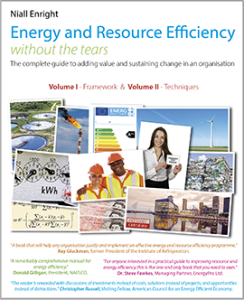The Ask – Management Commitment
 Asking for Management Commitment to an energy or resource efficiency programme can be daunting. After all management folks are important, and busy, and showing why greater efficiency is material to the organisation can be difficult. Here are a few simple tips that can make “The Ask” easier and more successful.
Asking for Management Commitment to an energy or resource efficiency programme can be daunting. After all management folks are important, and busy, and showing why greater efficiency is material to the organisation can be difficult. Here are a few simple tips that can make “The Ask” easier and more successful.
The first thing to bear in mind is that almost all management folks, like everyone else, would agree with the proposition that efficiency is fundamentally “a good thing”. The main barrier to getting approval is usually whether the effort and cost associated with delivering a programme now is worthwhile given the other priorities of the business, uncertainty about the outcome and limited resources. With this in mind, my tips are:
| 1. |
Recognise that time is a always a factor – clearly describe the individual time commitment required from the decision-maker as it is usually less than they assume. |
| 2. |
The programme is in competition so you need to make it clear that the resources requested are proportionate to the benefit and, ideally, superior to the alternatives available. |
| 3. |
Because resource efficiency almost always lowers operating expenditure, we can argue that the funds for the program already exist (as a line item “waste” hidden in the operations/resources budget). |
| 4. |
Committing to a program requires a leap of faith. Get endorsements from others to give credence and introduce milestones (e.g. finance approval) and reporting to reduce apparent risk. |
| 5. |
Make it clear that we need to act now. |
Here’s an example: (idealised of course!):

Champion (to Site Manager): I’ve got some good news for you!
Manager: Oh really! What’s that?
Champion: Our programme audit has shown we can cut $1m a year off our costs – and we can do this with an average of a two-year payback and a positive cash-flow after just six months.
Manager: Sounds too good to be true. What’s the catch?
Champion: Here’s the deal – I need you to commit to 15 minutes of your time once a month. If you give the programme this, I am confident of success.
Manager: Is that all? How does that work?
Champion: Well, you need to spend 15 minutes of your monthly management meeting discussing energy and resource efficiency with your Department Heads. We’ll set up all the honest and fair progress indicators in advance. If the Department are doing well you let them know and if they are struggling you see what help they need.
Manager: So how are the $1m savings made?
Champion: The business case from the audit has already identified the specific projects and behaviour changes that can deliver the saving – we just need to crank the handle. By getting your focus on resources at your management meeting then the Departments Heads are going to devote some time to this at their own meeting – maybe 15 minutes a month also. The Team Leaders will then start covering this at their Monday morning meetings, working out what they need to do that week. That way we get everyone involved in delivering the projects, operational improvements and maintenance changes. They’ll get started on the stuff the audit picked up but it won’t be long before we have a new heap of projects and ideas.
Manager: But my folks are real busy already.
Champion: That’s right! What why we’re going to involve a lot of people for a little time each and we’re going to help them with a bunch of neat tools to make better informed decisions around energy and resources. It’s not a question of working harder but working smarter. The key is to get better-informed decision-making and letting folks make the better decisions. And remember there’s $1m available for us each and every year so the sooner we get started the sooner we get these savings to the bottom line!
Manager: So I get the time thing. What’s that going to cost us in $?
Champion: With a two-year payback we’re basically going to have to spend $2m to get the $1m savings. But here’s the thing: we have already committed that $2m – it simply in a budget line called “waste” hidden in our energy, water and raw materials costs. So we don’t need new money, all we need is a little cash-flow to get the programme up and running – $250,000 to be precise. We”ll focus on the quick, cheap savings first so within 6 months we will have covered that up-front cost and will be making a net saving which will help fund the longer-payback projects. To be clear, within 6 months we will be adding to our bottom-line financial performance.
Manager: How do we make sure this delivers?
Champion: Bear in mind that the finance folks will approve all the individual projects so we aren’t setting ourselves up to write a blank cheque on this. You’ll be getting a monthly report for your management meeting so you know exactly where the project is. Also I’ve had our Site Finance Director and Engineering Manager look over the audit findings and they are confident that the savings are there. All we need is your support. |
Would you say “no” after this conversation?
Of course the subject of gaining management commitment is not as simple as this post suggests.
I have touched on other aspects in my earlier posts on certainty and on procastination.
For more ideas and challenges check out all the posts on this site.
Learn what an effective resource efficiency framework looks like.
Read reviews of books on the theme of change.
Or learn how SustainSuccess services can drive improvement in your organisation.
 Asking for Management Commitment to an energy or resource efficiency programme can be daunting. After all management folks are important, and busy, and showing why greater efficiency is material to the organisation can be difficult. Here are a few simple tips that can make “The Ask” easier and more successful.
Asking for Management Commitment to an energy or resource efficiency programme can be daunting. After all management folks are important, and busy, and showing why greater efficiency is material to the organisation can be difficult. Here are a few simple tips that can make “The Ask” easier and more successful.



0 Comments